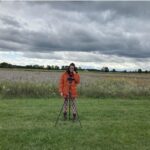Michaela Rose works as a Laboratory Technician in the Haddad lab at MSU's Kellogg Biological Station, and studied Zoology and Film Studies at North Carolina State University. She recently produced a series of films capturing the ecology and research of the KBS LTER. All of Michaela's videos can be viewed on the Kellogg Biological Station YouTube page! Although there are many media forms where we consume information on the daily, film remains one of the most influential. Short snippets or stories on social media platforms such as Twitter, Youtube, and Instagram are viewed by
Kellogg Biological Station | Long-Term Ecological Research
